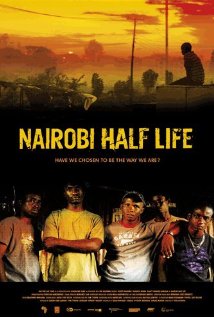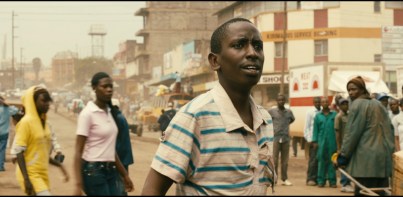Nairobi Half Life (Day 50)
 My Opinion: 7.7 || An absorbing, beautifully textured story. The young protagonist is an impressively three-dimensional character, and Nairobi itself is such a vibrant presence that you can almost taste and feel it. The overly tidy conclusion is not on a par with the realism that’s precedes it, but that’s a small flaw given everything else that the film does right.
My Opinion: 7.7 || An absorbing, beautifully textured story. The young protagonist is an impressively three-dimensional character, and Nairobi itself is such a vibrant presence that you can almost taste and feel it. The overly tidy conclusion is not on a par with the realism that’s precedes it, but that’s a small flaw given everything else that the film does right.
TITLE: Nairobi Half Life
DIRECTOR: David ‘Tosh’ Gitonga
LANGUAGE: Swahili | COUNTRY: Kenya
YEAR: 2012
PROFILE: Drama | 96 minutes| IMDb (7.6)
SYNOPSIS (Courtesy of IMDb): Mwas, a young, aspiring actor from upcountry Kenya dreams of becoming a success in the big city. In pursuit of this and to the chagrin of his brother and parents, he makes his way to Nairobi: the city of opportunity.
Strengths: There are many ways that a story like this can go wrong, and Gitonga avoids nearly all of them. The need to survive drives the naïve Mwas toward crime, but Gitonga’s isn’t selling a clichéd narrative of lost innocence or gangster thrills. We wait for the tropes of the “gritty urban drama” to show up, but they never do. Mwas is victimized, but he’s not a victim. He commits crimes but never entirely seems like a criminal. And although he’s faced with difficult decisions, we’re spared the narrative turns that are a staple of screenwriting handbooks. By refusing to draw clear lines or lessons and by shunning the conventions of urban crime stories, Gitonga achieves a rare degree of poignancy and realism.

Weaknesses: The conclusion involves some luck and timing that’s too good to be true, and the set up for the ending is visible well in advance. At the other end of things, Mwas string of hard luck when he gets to Nairobi comes close to narrative piling on, but Gitonga and his great young actor make it work.
Characters/Performances: Joseph Wairimu is outstanding in the very difficult role of Mwas. At the movie’s outset, he portrays Mwas’s fear and suffering without ever making him into a pathetic figure. Later, he makes Mwas a credible member of the gang without ever losing the character’s gawky, ingenuous charm.
Not only does Gitonga spare Mwas from outright victimhood, but he does the same with all his characters. It’s depressingly common in films of this type for the filmmakers to serve up at least one character (very often a girl or woman) who exists as a kind of sacrificial lamb at the altar of our sympathies — someone who exists solely to be a pathetic sufferer. There’s one very obvious candidate, a young prostitute, but Gitonga grants her agency over her life, and one of the film’s better moments plays with our expectation (and Mwas’s expectation) that she can’t protect herself.

Side Note: Tom Tykwer, who directed Run Lola Run (and, more recently, Cloud Atlas), is listed as the film’s “Supervising Director.”
File Under: urban life, gangs, acting, survival, corruption, prostitution, great protagonists
Pingback: Feed Me Subtitles: Best of Week 8 | Folded Story Project
Pingback: Feed Me Subtitles: Best of the Second Month | Folded Story Project